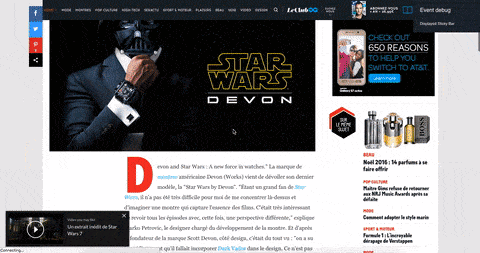 Pulpix, a video platform that aims to increase the time consumers spend on publishers’ properties, has raised $850,000 in “pre-seed” financing.
Pulpix, a video platform that aims to increase the time consumers spend on publishers’ properties, has raised $850,000 in “pre-seed” financing.
The two-year-old, Paris-based Pulpix is a Y Combinator startup whose backers include Studio VC, Ace Capital and angel investors such as Chon Tang, who invested early on in the video DSP TubeMogul.
The startup works with 50 publishers, including French daily L’Équipe, Prisma Media and GQ France, and plans to accelerate product development and staff its fledgling New York office with the capital raised.
Pulpix’s vision is to power personalized video streams and recommendations for publishers. It hopes to bring the same kind of binge-viewing behavior on YouTube to publishers’ own portals, according to Sabry Otmani, co-founder and CEO of Pulpix.
“We want to help them monetize better, but that starts with improving the video experience,” he said.
Like other video startups, Pulpix is doubling down on artificial intelligence by using advanced algorithms to personalize video streams and recommendations.
“Publishers want to increase their revenue streams by engaging users with video on their own properties,” Otmani said. “Their own websites and native applications are where they have full control over the inventory and the audience. And, at the end of the day, the CPMs are much higher than anywhere else.”
Maxime Auburtin, who is responsible for video content and distribution at Condé Nast France, said his publications use Pulpix to gauge user interaction with editorial and branded video content – and to determine the frequency at which the publisher distributes these videos.
“Our next challenge is how we produce content and monetize it better, because video content is really expensive,” Auburtin said. “Right now, across YouTube, Facebook, Instagram and our own websites, the first metric we look at is video views to see how people consume content. We’re not doing this now, but eventually [we’ll get to] time spent and [average] watch times.”
Pulpix would run JavaScript tags on the publisher’s page or integrate them with video players like Brightcove, Ooyala and Dailymotion – which Condé Nast France uses – among others.
These tags help Pulpix report the average completion rate of each video and which videos are trending, and can be used to determine whether ad-supported or non-ad-supported videos get more engagement.
Pulpix claims its platform goes way beyond the basic analytics that come with many video players, because publishers can track average article completion rates based on a user’s scrolls and can run control tests for articles with or without videos. Pulpix also can integrate with a publisher’s CRM or DMP, Otmani said.
The company also offers a “multitask” unit, which lets a consumer render a video overlay without obstructing an article’s view.
And the overlay itself has interactive elements, so a consumer can pull up a recommended article or share the video to social media without waiting for the video to end.
 Eventually, Otmani envisions pushing beyond online video into over-the-top environments or mobile apps. But that will come later.
Eventually, Otmani envisions pushing beyond online video into over-the-top environments or mobile apps. But that will come later.
“Right now want to focus our efforts on the vertical of online publishers and news publishers,” he said.














